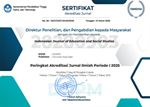Ahmad, M., & Rochimah, H. (2021). Improving Teaching Effectiveness through Transformational Leadership and Integrity. International Journal of Evaluation and Research in Education, 10(4), 1316–1324. https://doi.org/10.11591/IJERE.V10I4.21801
Al-Obaydi, L. H., (2020). The Use of Action Research in EFL Socio-professional Context: Students-teachers’ Perceptions. Interdisciplinary Studies in Humanities, 3(3), 232–240. https://doi.org/10.34050/elsjish.v4i2.10876
Anam, N. (2022). Play and Learn with Tradisional Local Wisdom Game in School. Indonesian Journal of Education and Social Studies (IJESS), 1(1), 12–27. https://doi.org/10.33650/ijess.v1i1.3551
Arfiani, Y., Hayati, I. K. A. (2021). The Implementation of The PJBL Method Assisted by Padlet on Environmental Pollution Material on Student Science Literature. Journal of Science Education Research, 5(2), 21–27. https://doi.org/https://doi.org/10.21831/jser.v5i2.44289
Badariah, S. (2021). Pengembangan Media Pembelajaran VideoScribe dalam Pembelajaran Tematik di Sekolah Dasar. Jurnal Pendidikan dan Pembelajaran, 10(5), 1–9. https://doi.org/10.30651/else.v5i2.6951
Burdine, T. J., Thorne, S., & Sandhu, G. (2021). Interpretive Description: A Flexible Qualitative Methodology for Medical Education Research. Medical Education, 55(3), 336–343. https://doi.org/10.1111/medu.14380
Cencelj, Zvonka; Aberšek, Metka Kordigel; Abersek, Boris; Flogie, A. (2019). Role and Meaning of Functional Science, Technological and Engineering Literacy in Problem-Based Learning. Journal of Baltic Science Education, 18(1), 132–146. https://doi.org/10.33225/jbse/19.18.132
Debbag, Murat; Fidan, M. (2020). Examination of Text and Video-Formatted Learning Diaries in the Teacher Education. Australian Journal of Teacher Education, 45(3), 1–17. https://doi.org/10.14221/ajte.2020v45n3.1
Diamond, A. H. (2020). The social reproduction of science education outcomes for high school students in Israel. British Journal of Sociology of Education, 41(7),1029-1046. https://doi.org/10.1080/01425692.2020.1806040
Djupe, P. A., & Neiheisel, J. R. (2022). The Religious Communication Approach and Political Behavior. Political Psychology, 43, 165–194. https://doi.org/10.1111/pops.12848
Hasanudin, C., & Fitrianingsih, A. (2020). Verbal Linguistic Intelligence of the First-Year Students of Indonesian Education Program: A Case in Reading Subject. European Journal of Educational Research, 9(1), 117-128. https://doi.org/10.12973/eu-jer.9.1.117
Hennink, M., & Kaiser, B. N. (2022). Sample Sizes for Saturation in Qualitative Research: A systematic Review of Empirical Tests. Social Science & Medicine, 292, 114523. https://doi.org/10.1016/j.socscimed.2021.114523
Ibda, H., Nur (2022). Game Innovation: A Case Study using The Kizzugemu Visual Novel Game with Tyranobuilder Software in Elementary School. Indonesian Journal of Electrical Engineering and Computer Science (IJEECS), 28(1), 460–469. https://doi.org/10.11591/ijeecs.v28.i1.pp460-469
López-Marqués, R. L., Nørrevang, A. F., Ache, P., Moog, M., Visintainer, D., Wendt, T., & Palmgren, M. (2020). Prospects for The Accelerated Improvement of The Resilient Crop Quinoa. Journal of Experimental Botany, 71(18), 5333-5347. https://doi.org/10.1093/jxb/eraa285
Nasution, A. S. N. (2021). Quizizz: Science Learning Media in Elementary School in Developing Critical Thinking Skills. Journal of Science Education Research, 5(1), 26–30. https://doi.org/10.21831/jser.v5i1.38592
Nur, A. R. (2020). Peningkatan Hasil Belajar IPA melalui Model E-Learning dengan Media Videopada Siswa Kelas IV MIN 4 Sukoharjo Tahun Pelajaran 2019/2020. IAIN Salatiga.
Ozden, M. (2020). Elementary School Students’ Informal Reasoning and Its’ Quality Regarding Socio-Scientific Issues. Eurasian Journal of Educational Research, 86, 61–84. https://doi.org/10.14689/ejer.2020.86.4
Pratama, D. P. A., & Sakti, N. C. (2020). Pengembangan Media Pembelajaran Handout Digital Berbasis Android Pada Materi APBN dan APBD Kelas XI IPS. Jurnal Pendidikan Ekonomi Undiksha, 12(1), 15–28. https://doi.org/10.23887/jjpe.v12i1.25327
Ranaweera, P. (2008). Importance of Information Literacy skills for an Information Literate society. In NACLIS 2008, Colombo (Sri Lanka), 24th June 2008.
Rusdiansyah, S., & Leonard. (2020). Pengembangan Media Pembelajaran Motion Graphic Matematika berbasis Android pada Siswa Kelas V SD Semester 1. Jurnal Pendidikan dan Pembelajaran Dasar, 7(2), 135–144. https://doi.org/10.24042/terampil.v7i2.6996
Saraswati, Y., (2021). Science Literacy Profile of Junior High School Students Based on Knowledge, Competence, Cognitive, and Context Aspects. IJORER : International Journal of Recent Educational Research, 2(3), 329–341. https://doi.org/https://doi.org/10.46245/ijorer.v2i3.118
Singgih, Wardhana, O., Rusly, H. (2022). Interactive Chemical Bond Electronic Module Based on Nature of Science (NoS) to Improve Scientific Literacy Knowledge. Journal of Science Education Research, 6(1), 15–23. https://doi.org/10.21831/jser.v6i1.47575
Škėrienė, S., & Jucevičienė, P. (2020). Problem Solving through Values: A Challenge for Thinking and Capability Development. Thinking Skills and Creativity, 37, 100694. https://doi.org/10.1016/j.tsc.2020.100694
Sözeri, Mahmut Can; Kert, S. B. (2021). Ineffectiveness of Online Interactive Video Content Developed for Programming Education. International Journal of Computer Science Education in Schools, 4(3). https://doi.org/10.21585/ijcses.v4i3.99
Zaini, A. W., Susilawati, S., & Astuti, R. N. (2022). Improving Student Learning Outcomes Through the Development of Videoscribe Sparkol-Based Learning Media. At-Tarbiyat: Jurnal Pendidikan Islam, 5(3).
Zalik, N. (2020). Literation Movement for Leading Schools: Best Practice and Leadership Power. International Journal of Evaluation and Research in Education, 9(1), 227–233. https://doi.org/10.11591/ijere.v9i1.20279

 (Institut Islam Nahdlatul Ulama Temanggung)
(Institut Islam Nahdlatul Ulama Temanggung) 



